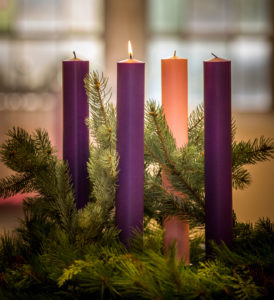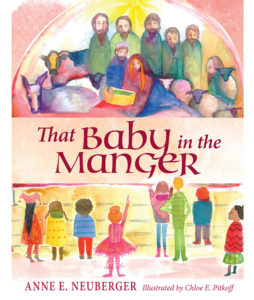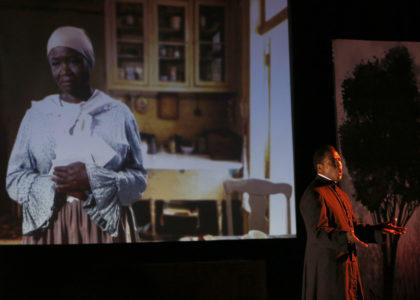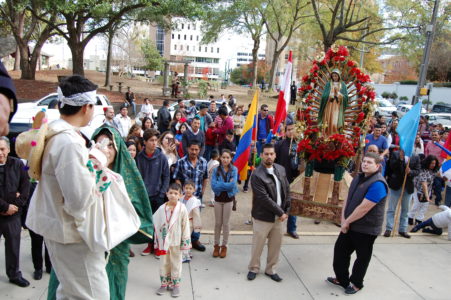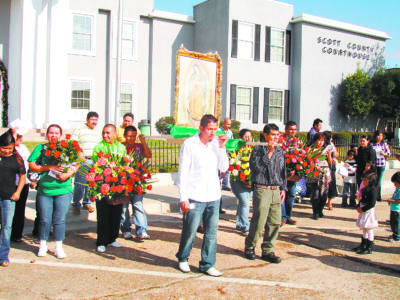By Dennis Sadowski
WASHINGTON (CNS) – A new presidential administration and a new Congress kept the U.S. Conference of Catholic Bishops as busy as ever in addressing public policy issues during 2017.
Hardly a week passed without at least one reaction, statement or commentary, all based on traditional Catholic social teaching, on a public policy matter from a USCCB committee chairman or other conference officers.
From President Donald Trump’s January travel ban on the entry of people from certain Muslim-majority nations to the Republican-written tax reform legislation that continued to be debated in Congress in mid-December, bishops repeatedly laid out moral arguments on the importance of protecting human dignity at every turn.
The bishops issued an estimated 115 public statements and letters addressing public policy concerns through Dec. 12, according to the news releases listed on the USCCB website, www.usccb.org. That’s more than double the approximately 47 public statements and letters released in 2016.
Some of the statements were joined by leaders at Catholic Charities USA and Catholic Relief Services when appropriate. Those agencies also issued their own statements on many of the same issues.
But it was the bishops’ voice gaining the attention of Congress and the White House.
Bishop Frank J. Dewane of Venice, Florida, chairman of the bishops’ Committee on Domestic Justice and Human Development, has added his name to many of the statements.
He told Catholic News Service that he and his fellow bishops didn’t go out looking “to make a lot of statements,” but that it became necessary to bring a Catholic perspective to policy stances being addressed by the White House and in Congress.
“I think it wasn’t just us. A number of these issues were arising for a number of reasons,” he said.
“It’s cyclical,” he said. “It’s cyclical in the sense the issues arose that touch deeply on the principles we look at to guide society. These policies are always the same for us.”
Bishop Dewane pointed to the Trump administration’s immigration-related policies and the high-profile tax reform legislation – the first major overhaul of the tax code in more than 30 years – as two areas where the bishops wanted to be sure to have their voice heard.
“Budgets and tax legislation are moral documents. … We’re looking to care for the poor, strengthen family, progressivity in terms of the tax program. If we stop and reflect on the centrality of the family in every society, we need to speak up for that,” Bishop Dewane said.
Immigration policy – from continued calls for comprehensive immigration reform to the administration’s decision to end Temporary Protected Status for people from Nicaragua, Haiti and Sudan – drew the most public responses from various USCCB committee chairmen with more than two dozen statements.
In 2016, the bishops addressed immigration six times.
Their first statement on immigration actually came in response to an early January change in policy by President Barack Obama’s administration that ended a long-standing agreement that allowed Cubans who arrive in the U.S. without visas to remain in the country and gain legal residency. The change came just before Trump assumed the presidency.
At the time, Bishop Joe S. Vasquez of Austin, Texas, chairman of the Committee on Migration, said that the bishops opposed the change in the so-called “wet foot, dry foot” policy, saying doing so will “make it more difficult for vulnerable populations in Cuba, such as asylum seekers, children and trafficking victims, to seek protection.”
Other issues that have garnered significantly more comments from the bishops in 2017 than 2016 include the federal budget and the importance of prioritizing the needs of poor and vulnerable people in spending and tax reform; racism; health care; the environment and climate change; and religious liberty, particularly around the world.
When it came to pro-life issues, including conscience protections for health care workers, the bishops issued eight statements, the same as in 2016.
At mid-year as Congress attempted to dismantle the Affordable Care Act, the bishops repeatedly called for certain provisions to remain, saying that rescinding the law altogether would result in millions of people losing health care insurance coverage.
The ACA has been controversial since it became law in 2010 because some of its provisions – abortion coverage, the contraceptive mandate of the Department of Health and Human Services, and the exclusion of immigrants in the country illegally from being covered – violated church teaching. But in the end the bishops opposed its total repeal because it had significantly reduced the number of Americans without health insurance coverage. Ultimately, the Republican-led Congress failed to repeal the ACA.
The bishops also took a strong stance in favor of the environment, addressing the topic 10 times. Their statements opposed Trump’s decision to begin the process of withdrawing the United States from the Paris climate agreement and efforts by the Environmental Protection Agency to roll back the Clean Power Plan that limits carbon emissions from coal-fired power plants.
Bishop Dewane told CNS that being in the forefront of various public debates is vital for the life of the church. He admitted he did not expect as a committee chairman to have to devote as much time as he has to reviewing statements, signing letters and appearing at news conferences this year.
“I could us a little more prayer time,” he said.
Still, he added, the need to publicly uphold human dignity is necessary for the church.
“We’ve got to speak up.”
(Follow Dennis Sadowski on Twitter: @DennisSadowski)

